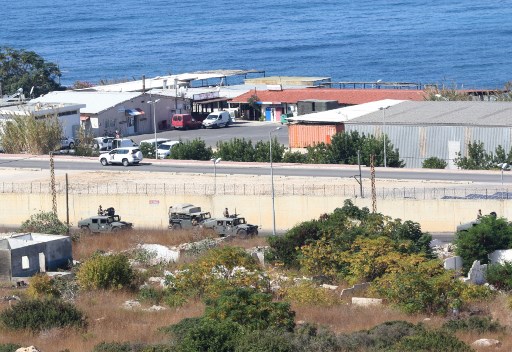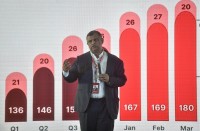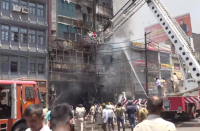
NAQURA, Lebanon (AFP) — Lebanon and Israel held US-mediated negotiations over their disputed maritime border on Tuesday after a months-long hiatus, in efforts to clear the way for offshore oil and gas exploration.
The five-hour indirect talks, between countries still technically at war, were held at the UN base in the town of Naqura in southern Lebanon, the National News Agency (NNA) said.
Washington said Friday they were to be brokered by US diplomat John Desrocher, and called the resumption of talks “a positive step towards a long-awaited resolution”.
Lebanon and Israel last year also took part in indirect US-brokered talks to discuss demarcation.
But those talks stalled after Lebanon demanded they cover a larger area, including part of the Karish gas field, where Israel has given exploration rights to a Greek firm.
Last year’s talks were supposed to discuss a Lebanese demand for 860 square kilometres (330 square miles) of territory in the disputed maritime area, according to a map sent to the United Nations in 2011.
But Lebanon then said the map was based on erroneous calculations and demanded 1,430 square kilometres (552 square miles) more territory further south, including part of Karish.
The Lebanese presidency said in a statement after Tuesday’s meeting that US mediation wanted negotiations to deal with Israeli and Lebanese maps “registered with the UN”, referring to the 860 square kilometre area.
“This contravenes the Lebanese proposal and the principle of negotiating without preconditions,” the statement said.
Energy ambitions
President Michel Aoun “has given his instructions to the (Lebanese) delegation so that the continuation of negotiations is not conducted according to preconditions”, it added.
To modify the 2011 map, Lebanese authorities must notify the UN of their new coordinates, but the president still has not signed the official decree on the changed border points.
International law remains “the basis for guaranteeing the continuation of negotiations and reaching a just and fair solution desired by Lebanon”, Aoun added.
A source at the Lebanese presidency told AFP earlier Tuesday that both Israel and Lebanon had demanded a different demarcation line.
“We don’t accept the line they’ve proposed, and they don’t accept ours, so we’ll see what the mediator suggests,” the source said.
Lebanon has insisted that the discussions with Israel are “technical” rather than political, and with the sides only communicating via the mediator.
Last month, Aoun demanded Israel halt all exploration in Karish until the dispute was settled.
In February 2018, Lebanon signed its first contract for offshore drilling for oil and gas in blocks 4 and 9, with a consortium comprising energy giants Total, ENI and Novatek.
Lebanon in April said initial drilling in Block 4 had shown traces of gas but no commercially viable reserves.
Lebanon’s government stepped down after a massive blast at Beirut’s port in August last year, but deeply divided politicians have been unable to form a new cabinet.
Lebanese politicians hope commercially viable hydrocarbon resources off the coast could help lift the debt-ridden country out of its worst economic crisis in decades.
© Agence France-Presse







